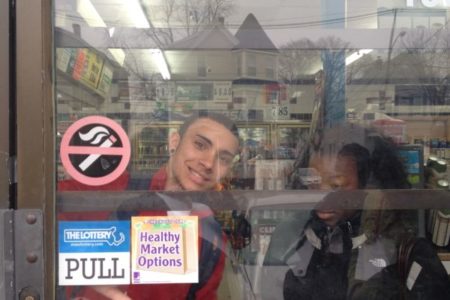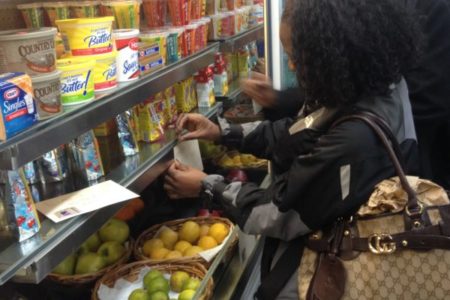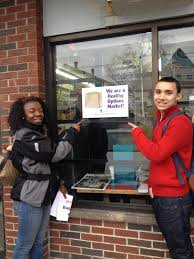Share On Social!
In the small, multicultural city of Lynn, Mass., minorities make up almost half the population, with Latinos making up almost a third. With obesity on the rise in the area, many groups are stepping up to make healthy changes where they live, work, and play. Local corners stores, where many kids hang out before and after school, are well-positioned to make a positive impact on kids’ food choices—if they are marketing the right foods. A group of high-school students chose one popular corner store to help promote healthy snacks and make it easier for teens to pick apples over chips—contributing to a wave of new healthy markets sweeping over Massachusetts.
EMERGENCE
Awareness: The small city of Lynn, Massachusetts gets more diverse every day. The Latino population grew from 18% to 32% from 2000 to 2010, according to Census data.
“It’s kind of a gateway for refugees,” explained Kristina Pechulis, the Lynn coordinator for Mass in Motion, a statewide movement that promotes opportunities for healthy eating and active living.
But no matter their culture, Lynn residents share a common struggle: obesity.
About 40% of students in the Lynn school district are overweight or obese, placing the district among the Top-10 most obese districts in the state, Examiner.com reports.
Part of the problem, Pechulis said, is students often choose unhealthy snacks at corner stores.

Source: Amanda Rzepkowski
Learn: Lynn has more than 130 corner stores. And while some do offer healthy produce and snacks, those options are far fewer or less visibly marketed than the stores’ offerings of cheap, processed junk food items like chips, candy and sugary drinks.
For example, Jayden Pena, a senior at Lynn English High School, and he and his friends usually opt for the easy choices at local corner stores, like Flamin’ Hot Cheetos.
“We definitely go for what’s convenient and what’s right there for us,” he said.
Frame Issue: To learn how to add healthier options and also make them attractive to youth, The Lynn Food and Fitness Alliance, a Mass in Motion initiative in Lynn funded by a network of partners, created the Lynn Youth Health Alliance (the youth alliance), a youth-engagement group that meets once a week to plan and implement health-improving service projects.
The youth alliance wanted to change teens’ choose-easy-junk-food mindset.
Corner stores, where junk foods are available and marketed to kids, are prime local teen hangouts.
“We wanted to focus on corner stores because research has shown that corner stores are where the youth have a lot of buying power…it’s a place they can go and spend their own money,” said Amanda Rzepkowski, who was brought on board with Mass in Motion to oversee the youth alliance in September 2013. Rzepkowski is an AmeriCorps service member with a background in nutrition.
To improve the corner store food environment, Rzepkowski said the youth alliance wanted to adopt Mass in Motion’s statewide “Healthy Market” program, which works with local corner store owners to make healthy food and drink options more readily available. About 24 corner stores across the state have become Healthy Markets.
In Lynn, no corner stores met the Healthy Market standards.
So the youth alliance sought to help stores make healthier options more visible via signage and placement, thus enabling both teens and adults to make healthier choices in their neighborhoods.
DEVELOPMENT
Education/Mobilization:Making over corner stores would take a lot of time and effort, so

Source: Amanda Rzepkowski
Rzepkowski decided that high-school students would be the best fit, because they tend to have more independence than younger students.
They also wanted youth who would take ownership of the work, not just take direction from adults.
“Youth to youth, rather than adults to youth,” Rzepkowski said.
Pena heard about youth alliance from a friend who had already participated. She invited him to a weekly after-school meeting at the beginning of the year. He went, liked it, and decided join.So Rzepkowski started recruiting teens from Lynn English High School in 2013.
The youth alliance eventually grew to about 8 members.
Debate: At first, Pena and some other students weren’t confident they could successfully change the corner stores to market healthier foods that students would buy.
“Honestly, I was very skeptical because I know the way I eat and the way other kids my age eat, and we’re not going into the corner stores to get healthy foods” but rather chips, candy and soda, he said.
Rzepkowski acknowledged the students’ doubts, but also saw their desire to make a difference.
“They are all excited and want to do work in their community,” she said, even if they weren’t sure if promoting healthy foods at the corner store would actually work.
The youth alliance, rather than Rzepkowski, made the decision on which corner store to target, because they knew which stores their peers frequented before and after school. Stores would voluntarily participate to get made over by the youth alliance and become part of the Healthy Market program.
For the first makeover, students chose Richdales, a popular teen hangout about two blocks from the high school.
ENACTMENT
Activation: Reggaqul Chowghery has owned the Richdales corner store for the past five years, and he owns a few other corner stores around town as well.
Youth alliance members visited Richdales to assess current food and drink offerings and the store layout.
The store had to meet Mass in Motion’s Healthy Market program standards:
- Offer a certain amount of healthy options:
-Fresh produce: At least two types of fresh fruits and two types of fresh veggies; dried or canned fruit (no sugar added); canned veggies (no salt added); and frozen fruits and veggies (with no added sugars or sauces)
-Cereals and grains: whole-grain cereals, whole-grain bread, whole-wheat pasta, brown rice, oatmeal, dried/canned low-sodium beans
-Drinks: 100% juice, water, fat-free or low-fat milk
- Comply with health codes and tobacco regulations.
- Accept federal food assistance programs, including the Special Supplemental Nutrition Program for Women, Infants, and Children (WIC; 41% of WIC participants are Latino) and the Supplemental Nutrition Assistance Program (SNAP; 15% of SNAP participants are Latino).
“Luckily for us, Richdales already had all of the requirements,” said Rzepkowski.
However, the store was not promoting or marketing its healthy items.

Making it easier to pick healthy snacks was the main point of the project, said Pena, so the youth alliance needed to change this to make a lasting impact.
“We wanted kids to come in and be like, ‘OK, instead of grabbing these chips I can grab this fruit,’” Pena said.
The students asked Chowghery if they could help promote his healthy options through new signs, advertisements, and other promotional materials.
He thought it was a great idea.
“I had actually tried to do something like this before by myself, but the youth helped a lot and it was a lot better,” said Chowghery, who noted he cares a lot about what his customers are eating, which is why he already stocked some healthy items.
“He was down 100% from the beginning,” said Pena.
Frame Policy: The youth alliance got busy deciding where to hang signs (produced by Mass in Motion) and place healthier foods.
“A lot of what we focus on is the marketing aspect” to lure customers’ attention away from chips and sugary drinks, said Rzepkowski. “By hanging up these signs, it directs people’s attention” to fruits and nuts.
During their store assessment, students noticed that Richdales had a cooler full of fresh produce, but it was in the back corner of the store. “How are we going to draw people’s attention there?,” asked Rzepkowski. They couldn’t move the fridge, but the students decided they could promote it with a few large signs in various places around the store.
Change: Over Fall 2013, the youth alliance placed signage and created a healthy items section at Richdales, transforming the corner store into a place where healthy food and drink items are not only available, but visible, too.
One eye-level sign at the front door lets customers know that healthy items are available.
A sign over the cooler denotes the fresh produce available in it, and another sign by the door reads “Fruits and Vegetables in the Back” to point customer toward the cooler.
Students also gathered all the store’s healthy snacks and drinks together to create a healthy items section to make it “easy” for customers to see, Rzepkowski said.
The youth alliance—skeptical at first—was now confident
“Once we started going into the store and hanging the signs…their confidence was building in the project,” said Rzepkowski.their hard work would translate into healthier choices being made by their peers.
IMPLEMENTATION
Implementation: Now when Pena goes to Richdales, perhaps to grab his new favorite snack, unsalted peanuts—quite a change from Flamin’ Hit Cheetos—he finds himself more aware of his food choices.
“Whenever I’m at the store, I’m checking the labels of things…if I would have grabbed chips, I’ll grab something else,” he said.
Rzepkowski said that when she and the students went to check on the store in early February, all the bananas in the front counter basket were gone.
“That’s a great sign
Equity/Sustainability: Pena says the group has plans to go into other stores near the school before the school year ends. Chowghery said he would like to expand the marketing into his other stores in the surrounding areas.
Rzepkowski is pleased at how the youth took ownership of this project. The youth alliance’s efforts were featured in two local online papers.
“Going through the process and having a successful store and seeing the promotion it’s getting, I think that for when we do more stores in the future I think that they are a little bit more optimistic,” she said.
Pena is very enthusiastic about his time in the Lynn Youth Food Alliance and the time spent working on the corner store to give his community some healthy encouragement.
“It’s always good to promote healthier eating, especially when we’re this young,” he said. “This is a great way to make a small difference.”
This success story was produced by Salud America! with support from the Robert Wood Johnson Foundation.
The stories are intended for educational and informative purposes. References to specific policymakers, individuals, schools, policies, or companies have been included solely to advance these purposes and do not constitute an endorsement, sponsorship, or recommendation. Stories are based on and told by real community members and are the opinions and views of the individuals whose stories are told. Organization and activities described were not supported by Salud America! or the Robert Wood Johnson Foundation and do not necessarily represent the views of Salud America! or the Robert Wood Johnson Foundation.
ABOUT THE PROGRAM
Salud America! The RWJF Research Network to Prevent Obesity Among Latino Children is a national program of the Robert Wood Johnson Foundation. The program aims to educate researchers, decision-makers, community leaders, and the public in contributing toward healthier Latino communities and seeking environmental and policy solutions to the epidemic of Latino childhood obesity. The network is directed by the Institute for Health Promotion Research at the University of Texas Health Science Center at San Antonio.
For more information, visit http://www.salud-america.org.
By The Numbers
1
Supermarket
for every Latino neighborhood, compared to 3 for every non-Latino neighborhood
This success story was produced by Salud America! with support from the Robert Wood Johnson Foundation.
The stories are intended for educational and informative purposes. References to specific policymakers, individuals, schools, policies, or companies have been included solely to advance these purposes and do not constitute an endorsement, sponsorship, or recommendation. Stories are based on and told by real community members and are the opinions and views of the individuals whose stories are told. Organization and activities described were not supported by Salud America! or the Robert Wood Johnson Foundation and do not necessarily represent the views of Salud America! or the Robert Wood Johnson Foundation.



